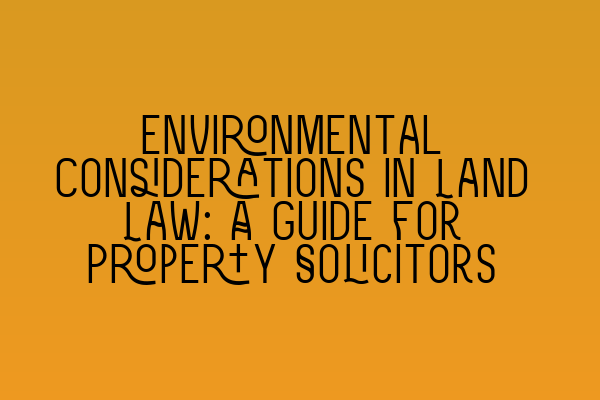Environmental Considerations in Land Law: A Guide for Property Solicitors
Welcome to SQE Property Law & Land Law, your trusted source for all things related to property law. In this blog post, we will provide you with a comprehensive guide on environmental considerations in land law. As a property solicitor, it is crucial to understand the environmental aspects that may impact your clients’ properties and transactions. So, let’s dive in!
The Importance of Environmental Considerations
Environmental considerations play a significant role in land law due to the ever-increasing focus on sustainability, conservation, and protection of natural resources. As a property solicitor, it is your responsibility to ensure that your clients are aware of any potential environmental issues that may affect their properties.
Whether it’s contaminated land, protected species, or planning regulations, understanding and addressing these environmental considerations can help you avoid legal disputes and protect your clients’ interests. It also demonstrates your commitment to sustainable and responsible property transactions.
Contaminated Land
One of the main environmental concerns in land law is contaminated land. Properties that have been previously used for industrial or commercial purposes may have soil, water, or air contamination. It is crucial to conduct thorough environmental due diligence to identify any potential contamination.
If contamination is discovered, it is important to assess the extent and nature of the contamination and advise your clients accordingly. They may need to take remedial action to meet legal requirements and maintain the value of their properties.
Our SQE 1 Practice Exam Questions article provides additional resources to help you test your knowledge on contaminated land and related legal principles.
Protected Species and Habitats
Another crucial aspect of environmental considerations in land law is protected species and habitats. Certain areas may be designated as protected for their unique ecological value, including endangered animals, plants, or habitats.
When dealing with properties near protected areas, it is important to consider any restrictions or obligations related to these designations. Your clients may need to obtain specific permits or undertake environmental assessments to comply with conservation regulations.
If you would like to further enhance your understanding of protected species and habitats, our article on SQE 1 Practice Mocks FLK1 FLK2 can provide you with valuable insights and practice questions.
Planning and Environmental Regulations
Awareness of planning and environmental regulations is essential for property solicitors. Local authorities often have rules in place to ensure that new developments are environmentally sustainable and do not harm the local ecosystem.
Part of your role as a property solicitor is to conduct thorough research to identify any planning restrictions or environmental obligations that may affect your clients’ properties. This includes assessing the impact of existing developments, infrastructure projects, or nearby industrial activities.
If you are looking for comprehensive preparation courses on planning and environmental regulations, our SQE 2 Preparation Courses are designed to equip you with the knowledge and skills required for these areas of land law.
Taking Action: Steps for Property Solicitors
Now that you understand the importance of environmental considerations in land law, let’s explore the steps you can take as a property solicitor to address these issues:
- Conduct thorough environmental due diligence during the property transaction process. This includes reviewing relevant documents, conducting site visits, and engaging environmental experts if necessary.
- Identify and assess any potential environmental risks or issues, such as contamination, protected species, or planning restrictions.
- Advise your clients on the potential implications of these environmental considerations and the steps they may need to take to mitigate any risks or comply with legal requirements.
- Collaborate with environmental professionals, such as ecologists or experts in contaminated land, to ensure that your clients receive accurate and up-to-date information.
- Review and negotiate environmental warranties and indemnities in contracts to protect your clients’ interests.
- Stay updated with the latest developments in environmental regulations and case law to provide informed advice to your clients.
If you are preparing for the SQE exams, our SQE 1 Preparation Courses can help you develop a comprehensive understanding of land law, including its environmental aspects. Don’t forget to check out the SRA SQE Exam Dates to plan your study and exam schedule effectively.
Conclusion
As a property solicitor, integrating environmental considerations into your practice is crucial to ensure responsible and sustainable property transactions. By understanding and addressing potential risks related to contaminated land, protected species, and planning regulations, you can protect your clients’ interests and contribute to a more environmentally conscious approach to land law.
We hope this guide has provided you with valuable insights and resources to enhance your understanding of environmental considerations in land law. If you have any further questions or need legal assistance, please do not hesitate to contact SQE Property Law & Land Law. We are here to help!
